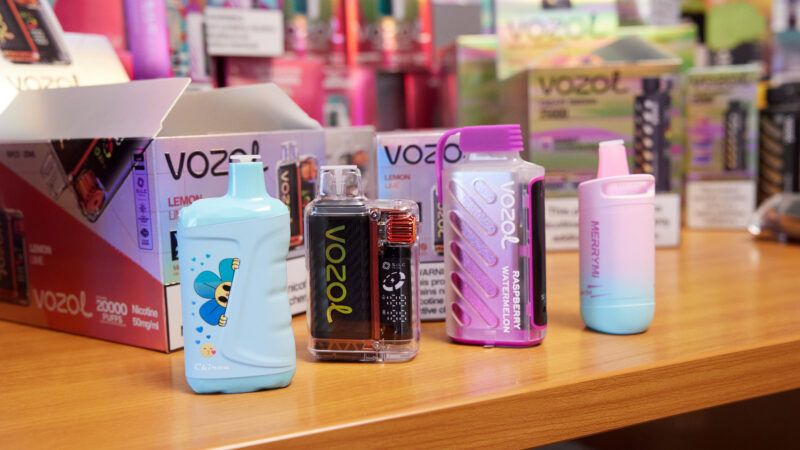Sell Flavored Tobacco in Massachusetts, Go To Jail
Massachusetts outlawed flavored tobacco. Now, just as criminal justice groups warned, a vape shop owner is serving time.

In 2022, I wrote an article for Reason predicting that it was only a matter of time before selling flavored tobacco products landed an American behind bars. Almost three years later, that day has arrived in Massachusetts. According to a press release from the Middlesex district attorney and the Department of Revenue, the owner of a Marlborough vape shop has pleaded guilty to three counts of attempted tax evasion arising from the sale of e-cigarettes brought in from across state borders. He was sentenced to serve six months in the House of Correction and five years probation.
In 2020, Massachusetts became the first state to implement a comprehensive ban on all flavored tobacco products, including menthol cigarettes and flavored e-cigarettes. Violation of the flavor ban is only a misdemeanor, but since flavored tobacco products are sold on the illicit market, sellers simultaneously violate state tax law. This brings much harsher penalties into play. In Massachusetts, evading taxes on tobacco products is a felony punishable by up to five years in prison.
Criminal justice reformers have warned for years that flavor bans would encourage illicit markets, creating felony crimes in the process. For example, a 2021 coalition letter signed by groups such as the American Civil Liberties Union and National Association of Criminal Defense Lawyers warned that a federal menthol ban would create "a massive law enforcement problem for states, counties, and cities since all states treat unlicensed sale of tobacco products as a crime—usually as a felony punishable by imprisonment."
This is a prescient description of how the comprehensive flavor ban in Massachusetts is working out. The latest annual report from the state's Multi-Agency Illegal Tobacco Task Force (published in February 2024) notes: "Field personnel are routinely encountering or seizing untaxed menthol cigarettes, originally purchased in other states, and flavored ENDS [electronic nicotine delivery systems] products and cigars purchased from unlicensed distributors operating both within and outside the Commonwealth. Without providing too much detail about the processes and methods of Task Force enforcement strategies, smugglers are developing more sophisticated smuggling operations to counter the Task Force's targeted investigations."
These annual reports document law enforcement activity directly related to the flavor ban. Massachusetts has seized so much contraband tobacco and so many e-cigarettes that the state struggles to find the capacity to store it all. There are many instances of individuals arrested for possessing allegedly commercial quantities of menthol cigarettes or flavored e-cigarettes, with some of these cases referred for prosecution.
The Marlborough case is one of the first, if not the first, to resolve with a guilty plea and criminal sentence. The defendant is 62-year-old Ashraf Youssef, who owned AAA Smoke and Vape Shop. According to prosecutors, he "routinely" purchased e-cigarettes from out-of-state distributors between 2020 and 2022, evading $467,000 in excise taxes. In high-tax states like Massachusetts, there are obviously financial reasons to smuggle products from other jurisdictions, but the prohibition on flavored products offers additional motivation.
The Massachusetts flavor ban took effect in 2020, and minutes from a 2022 Marlborough Board of Health meeting note multiple instances of Youssef's shop selling flavored products. In December of 2021, for example, a "Tobacco Control Manager stopped at the establishment, witnessed the sale of flavored tobacco products, and found 300 disposable flavored vapes." And in March of 2022, "The Marlborough Police Department was sent to investigate suspicious activity in the parking lot of AAA Smoke & Vape. They determined the business has a car parked outside where patrons can walk up & purchase flavored vape products for cash."
Such violations led to fines of several thousand dollars and suspensions of the store's permit to sell nicotine and tobacco products. Those are the kind of enforcement actions that antitobacco advocates envision when they portray flavor bans as mere product regulation. But as Youssef's case demonstrates, the application of state tax laws can easily escalate those penalties to include jail time.
Debates over tobacco flavor bans typically revolve around pragmatic concerns about lost tax revenue or effects on public health. Both provide reasons to be skeptical of flavor bans, especially with regard to e-cigarettes. The Multi-Agency Illegal Tobacco Task Force report notes that revenue from excise taxes on vapes declined by $2.4 million in the previous fiscal year and that "the ongoing suspected smuggling of untaxed tobacco products into Massachusetts could also be a factor contributing to the decline in revenue."
Additionally, new research suggests that bans on flavored e-cigarettes have the unintended consequence of increasing sales of conventional cigarettes. As the authors of a recent study concluded, "Any public health benefits of reducing ENDS sales via flavor restrictions may be offset by public health costs from increased cigarette sales."
But in addition to those policy tradeoffs, public health advocates must contend with the fact that bans on popular nicotine and tobacco products will raise issues of criminal justice. Do we want police staking out tobacco shops to catch retailers selling forbidden flavors of vapes to consenting adults? Is this a crime that justifies throwing a 62-year-old man into a jail cell?
Youssef's case may be the first to end in jail time for selling untaxed, flavored tobacco products but it certainly won't be the last. There are at least two other ongoing felony prosecutions in Massachusetts arising from flavored tobacco sales and likely more in the pipeline. Antitobacco activists can no longer dismiss warnings that flavor bans will lead to illicit markets, criminal prosecutions, and incarceration as unlikely hypotheticals. These are simply the actual outcomes in the first state to enact the policy.


Show Comments (8)